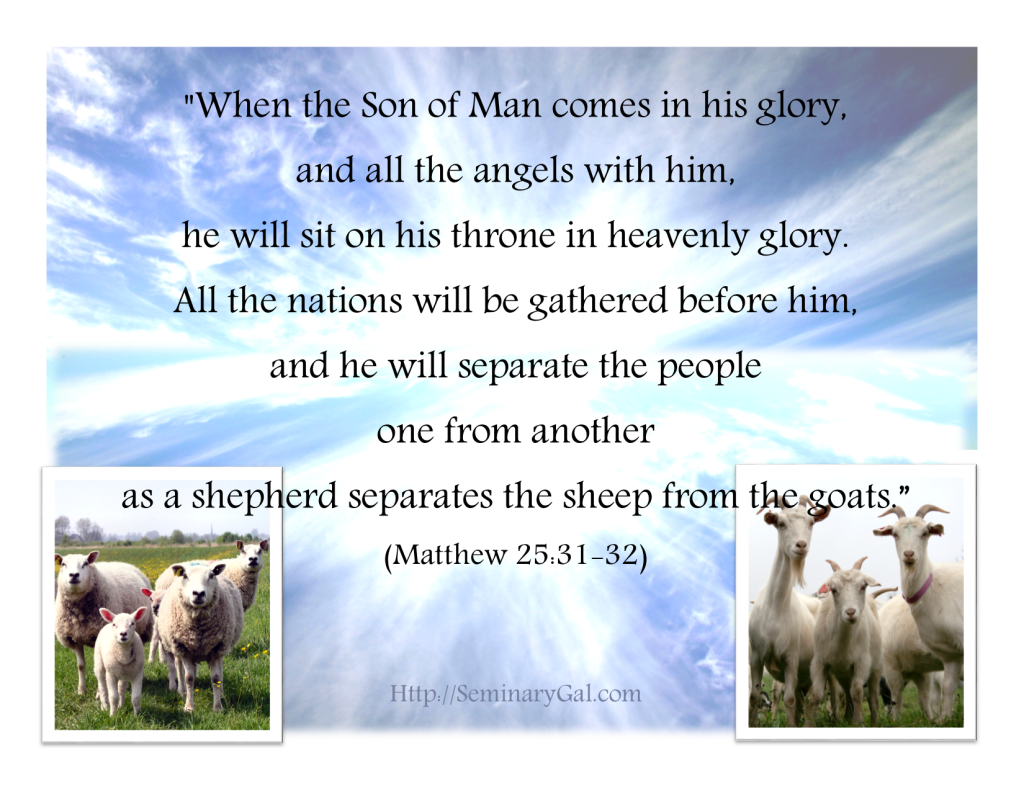This Scripture below is one of the favorites of those whose primary passion is Social Justice. Read this passage again and there are questions for reflection below.
Matthew 25: 31 “When the Son of Man comes in his glory, and all the angels with him, he will sit on his throne in heavenly glory. 32 All the nations will be gathered before him, and he will separate the people one from another as a shepherd separates the sheep from the goats. 33 He will put the sheep on his right and the goats on his left. 34 “Then the King will say to those on his right, ‘Come, you who are blessed by my Father; take your inheritance, the kingdom prepared for you since the creation of the world. 35 For I was hungry and you gave me something to eat, I was thirsty and you gave me something to drink, I was a stranger and you invited me in, 36 I needed clothes and you clothed me, I was sick and you looked after me, I was in prison and you came to visit me.’ 37 “Then the righteous will answer him, ‘Lord, when did we see you hungry and feed you, or thirsty and give you something to drink? 38 When did we see you a stranger and invite you in, or needing clothes and clothe you? 39 When did we see you sick or in prison and go to visit you?’ 40 “The King will reply, ‘I tell you the truth, whatever you did for one of the least of these brothers of mine, you did for me.’ 41 “Then he will say to those on his left, ‘Depart from me, you who are cursed, into the eternal fire prepared for the devil and his angels. 42 For I was hungry and you gave me nothing to eat, I was thirsty and you gave me nothing to drink, 43 I was a stranger and you did not invite me in, I needed clothes and you did not clothe me, I was sick and in prison and you did not look after me.’ 44 “They also will answer, ‘Lord, when did we see you hungry or thirsty or a stranger or needing clothes or sick or in prison, and did not help you?’ 45 “He will reply, ‘I tell you the truth, whatever you did not do for one of the least of these, you did not do for me.’ 46 “Then they will go away to eternal punishment, but the righteous to eternal life.
So, to all you Political Social Justice folks out there, I have some questions:
- People will be separated, one from another. How will Jesus judge those who paid their taxes and then stepped back, not wanting to get their hands dirty and instead, delegated it to the government to pay for food, water, clothing, housing, health insurance, and do prison visits? Does delegation count?
- Who in the government bureaucracy will be the sheep: all the ones who touched the money all along the way, or only the last handler of it before it reached the hungry, thirsty, stranger, etc.? Will it be fair that the last handlers would be in a job that allows them to be sheep while the rest of the people who cared just as much are punished for being earlier in the distribution process? What happens if the last handler or anyone along the way didn’t really care, but it was just a job? Do they get to be sheep, too?
- Does the Scripture passage say to alter the needy person’s station in life or simply provide for their needs-of-the-moment as a demonstration of love for the King?
- Does this passage tell us to take money from our neighbor’s bank account so they will do what we think they should do by caring for others? Or does it adopt more of a “You feed them” approach where each of us takes a very individual, active, and personally sacrificial interest in our fellow man? Furthermore, do our good intentions count if we use our neighbor’s money to do it instead of our own?
- What does it mean that these people being served are Jesus’ brothers? Are we all Jesus’ brothers in the same way, or is there a family of man and a family of God?
- Each human is made in the image of God. How does doing something for someone translate over to doing it for Jesus?
- Are there geographical lines to our helping in this situation above? If Jesus died for the US government to provide for US citizens (and possibly illegal immigrants), why do we draw national boundaries in our provision? Why not provide also for Canada, Mexico, Central and South America, etc.? What is our Scriptural reason to draw the lines on the northern and southern borders of the US?
- If food stamps and mandated health insurance are Jesus’ preferred means of provision, how do you see the government giving God the glory?
- Where is the individual’s joy in all of this by being a cheerful giver? Do charity and taxation provide equal levels of joy?
- We’re not all taxed equally. Some pay higher rates and end up contributing more government revenue than others. Will Jesus condemn the person who had no money to sacrificially give to another? Does He give the poor person a bye because he’s poor in the passage above?
- Where is the government in the Scripture above? Where is the Church?
- Does Jesus advocate political/governmental redistribution or charity? Why?
These are important questions for the person being theologically consistent.
Maybe today would be a good time to pray about what our obligations are in the brotherhood of man and what they are as Christians in the family of God.
